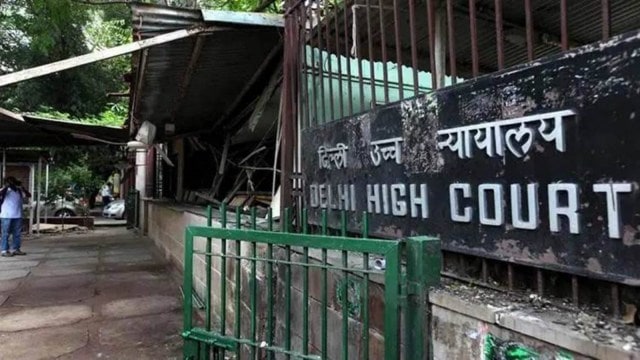17 complaints entertained by HC ICC in a decade, most related to ‘misunderstandings’: Justice Prathiba Singh
She also said that redressal for sexual harassment complaints need not only cater to women but should cover “men and all persons with different sexual orientations, so there may be a need for change in the legislation over here”.
 HC Chief Justice DK Upadhyaya Thursday said he has approved the guidelines, and these are expected to be made public soon.
HC Chief Justice DK Upadhyaya Thursday said he has approved the guidelines, and these are expected to be made public soon.Maintaining that the Delhi High Court’s Internal Complaints Committee (ICC) has entertained 17 complaints in the past decade, Justice Prathiba Singh on Thursday said that “most of the complaints arise out of misunderstanding or a lack of sensitivity of the terminologies that can be used towards colleagues”.
She also said that redressal for sexual harassment complaints need not only cater to women but should cover “men and all persons with different sexual orientations, so there may be a need for change in the legislation over here”.
Justice Singh, the presiding officer of the seven-member committee of the HC’s ICC, was speaking at the launch of an integrated online portal that allows for the filing of sexual harassment complaints. The portal not only includes the HC’s ICC, but also integrates the ICCs for the Delhi High Court Bar Association (DHCBA) and the Bar Council of Delhi (BCD).
“The existing ICC of the HC primarily handles complaints against the staff and maybe sometimes against any other person. However, in the working of ICC, we realised there is a big gap that needs to be filled, and that’s when we requested the DHCBA and the BCD… and now both have ICCs,” Justice Singh said.
“A collection of data would show that in the last 10 years, 17 complaints have been entertained by the Delhi HC ICC. In (Delhi’s) district courts’ ICC, there have been about 20-30 complaints… but it doesn’t mean there are only that many complaints. There may have been many other women who have not been able to file complaints in a confidential manner. During our experience in the Delhi HC ICC, we realise there is a hesitation among women to physically go and file complaints, which this portal intends to solve,” she added.
Sharing patterns of the complaints received by Delhi HC’s ICCs, Justice Singh further said, “One of the biggest things we realised during ICC proceedings was that most of the complaints arise out of misunderstanding or a lack of sensitivity of the terminologies that can be used towards colleagues. Sometimes men or women may use language which may not be acceptable, but they don’t know it is not acceptable language. So, sensitisation is one of the best ways this can be (remedied)… Most of the time, it is onlya misunderstanding…”
“The other challenge we faced was the quantum of time ICC had to spend on each of these complaints… Some of the challenges I personally felt… there is a huge amount of time that sitting judges has to spend on ICC complaints as trials take a long time, a large number of staff against whom complaints are filed are governed by CCS (CCA) Rules [Central Civil Services (Classification, Control & Appeal) Rules], and inquiries can be long drawn. We don’t know how to solve this problem… we need to find a solution…”
“So, there was a need felt that we should have our own guidelines, which can also be adopted by DHCBA and BCD… A sub-committee was formed to draft those guidelines and they have been finalised,” she added.
Delhi HC Chief Justice D K Upadhyaya on Thursday said he has approved the guidelines and the same are expected to be made public soon.
Batting for mediation to also be made a part of the initiatives taken to deal with sexual harassment complaints, Justice Singh said, “…a lot of ego issues which colleagues may have with each other… which may have converted into sexual harassment complaints… can get sorted.”
Expanding on the ambit of sexual harassment complaints, she added, “…While we are focusing on women filing sexual harassment complaints, the other experience was, several men who face these complaints face it wrongfully… If we don’t find anything in the complaint at the preliminary stage itself, we close several complaints… and there could be various extraneous conditions as well, which can lead to the filing of such complaints. The ICC is very conscious while dealing with such complaints… Some complaints are genuine and some are not, and I feel sexual harassment need not be constrained to women complainants but could also be extended to men and all persons with different sexual orientations, so there may be a need for change in the legislation over here.”
Justice Kotiswar Singh from the Supreme Court, who was present at the event, said, “While the POSH Act (Sexual Harassment of Women at Workplace (Prevention, Prohibition and Redressal) Act, 2013) has been understood in most jurisdictions, yet the number of cases being handled varies from HC to HC. Even in SC – I won’t go into details as some sensitive cases are being handled – but what I found was that this is particularly confined to the lawyers’ community.”
“So, it is a big responsibility of the Delhi Bar Council and Association to see that the redressal mechanism is properly put in place and the mechanism is indeed functional… We also need to sensitise people that certain acts are prohibited, cannot be tolerated… and it is not an easy process,” he added.







